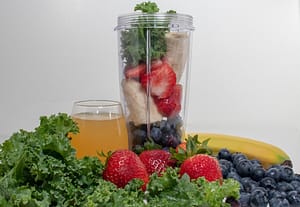What’s for breakfast? Morning dilemma solved- smoothies for busy women are the answer. The first rays of dawn break, and with them comes this inevitable question for busy women, especially those navigating the complexities of menopause and perimenopause. Forget endless deliberation and embrace the power of quick, nutritious smoothies (Smith, 2023). While thought leaders tout the benefits of high-protein breakfasts and the latest nutritional smoothie recipes for women over 40, the real struggle lies in balancing demanding careers, family responsibilities, and the hormonal shifts that impact weight management and overall well-being.
Caloric Conundrum: Hidden Sugars in Smoothies
Momentarily, let’s step away from the dazzling narratives spun by high-protein breakfast alternatives and metabolism-boosting smoothie recipes that dot the landscape of diet culture. Instead, let’s critically analyze the caloric conundrum these svelte pitchers present. Smoothies, often alluded to in our collective social consciousness as a cornerstone of health, can unwittingly become a vessel for stealthy sugars and excess calories, especially when undisciplined hands are pouring, The Guardian.
One may argue that smoothies are simple, brimming with fruits and vegetables—and they are indeed. But when was the last time sincere contemplation was given to the cumulated caloric content of these concoctions? Every dash of honey and every scoop of nut butter contributes to the tally, and for the woman whose metabolism has shifted into a lower gear amid menopause, each calorie counts with heightened significance. Unacknowledged, these well-meant morning rituals could contribute to the very weight creep they seek to curb.
Crafting Smoothies for Hormonal Harmony
In the vibrant dance of dietary deception, smoothies can either be nutrient powerhouses or sugar-laden pitfalls. They offer an impressive array of vitamins and minerals but must be crafted with a discerning eye to ensure they don’t metamorphose into inadvertent desserts masquerading as a ‘healthy start’. The true value of fibre, protein, and healthy fats must be meticulously evaluated to ensure that these liquid meals support, rather than sabotage, weight maintenance efforts in aging women.
And yet, we cannot forget the allure of smoothies—they stand as avatars of modern health, synonymous with vitality and convenience. Lean in closer, and you might hear the hum of blenders echoing the promise of meal replacement shakes and weight loss, the siren song for the rushed mother, or the professional juggling deadlines and doctor’s appointments. The question then evolves: Can we redefine the smoothie to genuinely serve as a touchstone of nourishment for the menopausal woman?
Debunking the Myth of the Magic Potion
Let us contemplate the myth of the magic potion and replace it with an enlightened understanding. The key lies in meticulous ingredient selection—harnessing the weight-loss properties of specific superfoods without falling prey to the seductive trap of hidden sugars and empty promises. Thoughtfully curated smoothies can be a symbiotic addition to a tailored diet plan, one that takes into account the day’s nutritional macrocosm.
In treading this delicate balance, we find empowerment and recognize that among menopausal barriers, such as fluctuating hormones and time scarcity, knowledge becomes power. With each spin of the blender, there lies an opportunity—not for a miraculous transformation but for a calculated, healthy choice that aligns with the nuanced demands of a body in transition.
Thus, we position the morning smoothie not as a miraculous wand but as a strategic tool in a broader arsenal aimed at harmonizing with menopause. It becomes less about the act of sipping on greens and fruits and more about intentional, informed eating habits. As women over 40 seek to navigate through the fog of transitioning bodies and busy lives, a mindfully made smoothie could very well be the beacon of balance they’ve been earnestly searching for.
As someone who’s battled midlife weight gain, I’ve learned that smoothies for busy women aren’t just quick—they’re lifelines when hot flashes zap my energy to cook.
Breakfast Dilemma Solved: Smoothies, Menopause and Metabolism
As daylight filters through curtains, women over 40 face menopause and metabolism challenges. The link between these is often unclear; myths about metabolism-boosting smoothies abound. Here, we uncover how menopause intricately affects metabolism.
The Metabolic Shift During Menopause
Menopause triggers a decline in estrogen, leading to muscle loss and increased fat accumulation. This shift slows metabolism, making weight management more challenging.
Previously, a woman’s metabolism could offset occasional dietary lapses or missed workouts. After menopause, the body’s adaptability decreases, requiring more mindful lifestyle choices. This metabolic shift underscores the importance of smoothies for busy women that prioritize protein and fiber.
Discussions often focus on meal replacement shakes and weight loss, neglecting the link between menopause and metabolism. Women are encouraged to use nutrient-rich smoothies for slimming without understanding their bodies’ transformations. We promise simplicity in the glass but overlook the complex endocrine symphony playing out beneath it all.
Hormonal Fluctuations and Weight Gain
The hormonal disruptions synonymous with menopause are not just abstract concepts. They are a corporeal reality, orchestrating fluctuations in weight and body composition. During menopause, declining estrogen levels cause the body to retain fat. Discussions should focus on hormonal influences on fat storage and metabolism.
Addressing this, we broach the subject of time constraints, often the insidious nemesis of women in their 40s and beyond. Time becomes as precious a commodity as health. This is true whether it’s a high-power career sprint or the nurturing marathon of motherhood. Or the endurance test of caring for aging relatives. In this rush, the smoothie stands out as a beacon of nutritious haste. Yet, how often do we consider the components of these breakfast concoctions and their alignment with a metabolically altered state?
Personalizing Smoothies for Menopausal Needs
Herein lies the power of personalization. Far from being a one-shake-fits-all solution, each nutrient-rich concoction must be tailor-fitted. A metabolism-boosting smoothie isn’t merely about tossing kale with abandon into a blender. Understanding which minerals and vitamins support a menopausal body is crucial. Strategic nutrient combinations can address a slowing metabolism, ensuring each sip satisfies and meets evolving needs.
Thus, we mustn’t just tout smoothies as panaceas. We must present them as a personalized strategy, crafted with the wisdom of menopause in mind. We substitute blanket promises with bespoke advice, replacing generalism with precision. In doing so, we don’t just provide women with a breakfast alternative; we furnish them with advice specific to those undergoing menopause.
Ingredients that Combat Symptoms
Incorporating specific nutrient-dense ingredients into smoothies can aid in managing menopausal symptoms and support metabolism:
- Leafy Greens: Spinach for magnesium (reduces fatigue) and Greek yogurt) and kale are rich in vitamins and minerals that support overall health.
- Seeds: Flaxseeds and chia seeds provide omega-3 fatty acids and fiber, promoting hormonal balance and aiding digestion.
- Protein Sources: Greek yogurt for probiotics (supports gut health during hormonal shifts) or plant-based protein powders like adaptogens like maca powder, shown to balance hormones in perimenopause can help maintain muscle mass and boost metabolism.
- Healthy Fats: Avocado and nut butter offer healthy fats essential for hormone production.
- Fruits: Berries and bananas add natural sweetness and are rich in antioxidants.
Consider a hormone-balancing smoothie. It might include almond milk, spinach, half a banana, flaxseeds, and protein powder. This combination provides a balance of nutrients beneficial during menopause.
Understanding menopausal metabolic changes is key. Thoughtfully selected smoothie ingredients can then help women manage weight and support overall health during this transition. Having experienced midlife weight gain, I know the value of quick smoothies. They’re lifelines, especially when hot flashes leave me with no energy to cook.
By embracing morning dilemma solved—smoothies for busy women, we reclaim control over our health without sacrificing time. While The 21-Day Smoothie Diet has been a game changer, it is just one option among many personalised strategies.



